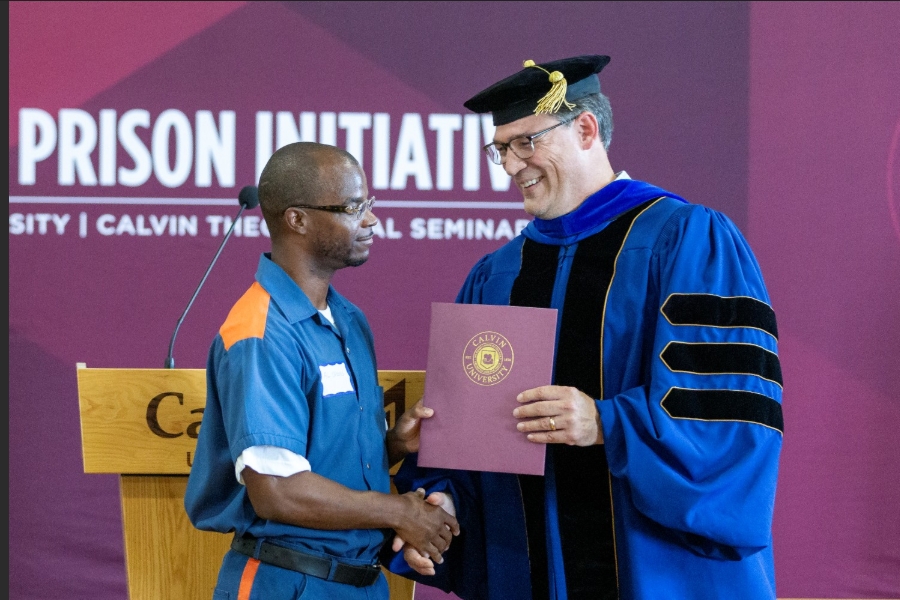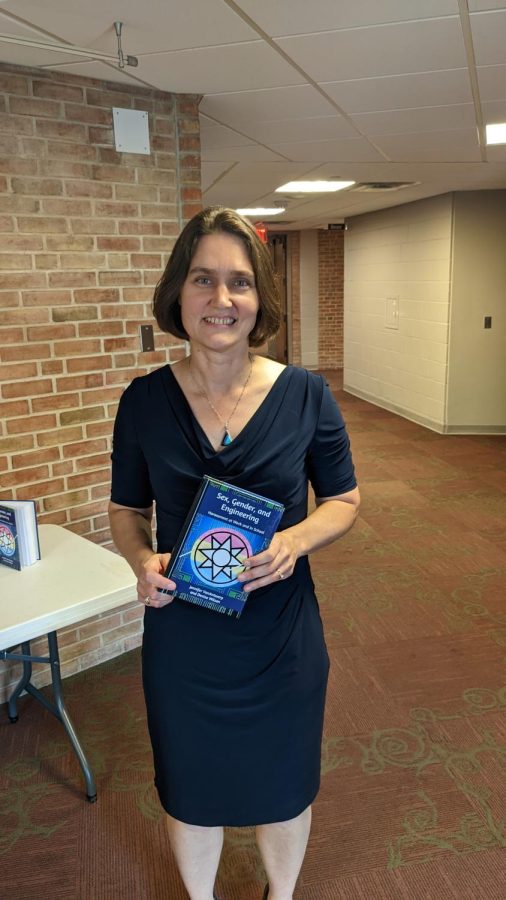The burst of executive orders at the outset of the Trump presidency included multiple measures pausing various kinds of federal financial assistance. The changes have left researchers and administrators at Calvin University wary and confused, wondering about the fate of crucial federal dollars.
Anding Shen, professor of biology, relies on federal research grants. When Chimes asked if there was a way to pivot away from reliance on federal funding, Shen laughed tiredly. “I hope I don’t get stuck,” Shen said. “It’s not easy to start something new.” Even after learning a new set of research procedures and designing experiments, the components to biological research are often prohibitively expensive, Shen said. “Without federal funding, I cannot do research. Calvin does not have that kind of funding.”
What’s up with federal funding
On Jan. 22, the White House ordered restrictions on the National Institute of Health, including a communications pause, a travel ban and the cancellation of meetings such as grant review panels. That pause was later expanded, with the acting director of the Office of Management and Budget (OMB) releasing a controversial memo that additionally appeared to pause not only funding and communications at the NIH but all “agency grant, loan, and other financial assistance programs” at the federal level.
According to the memo, this measure would have halted more than $3 trillion in federal spending nationwide, accounting for nearly a third of all federal expenditures. According to The New York Times, these figures for federal spending appear to be significantly inflated. Nevertheless, the affected areas of federal spending include many research grants and federally funded offices, some of which operate at Calvin.
Amid bipartisan uproar over how this memo was to be enforced, the White House announced on Jan. 29 that it would be rescinding the order. However, further confusing matters, press secretary Karoline Leavitt announced on X that the reversal was “not a rescission of the federal funding freeze. It is simply a recission of the OMB memo.”
Whatever the status of the government-wide funding pause, the original NIH freeze of communications and grant review panels remains in effect. The continuing communications freeze means that, as things stand, key grant-review meetings won’t happen. As of Friday, Jan. 31, health-related information on several government websites had become unreachable as a result.
Even though the blanket federal funding pause has been walked back, a climate of uncertainty persists among organizations and professors on campus whose financial security has been potentially jeopardized. For many offices on campus, what was once thought to be a secure source of funding has now been called into question.
STEM research in jeopardy: Prof. Shen
For the past 13 years, Prof. Shen has received a federally funded grant from the National Institute of Health (NIH) to conduct research on how certain specialized cells called endothelial cells — the lining of our veins and arteries — affect HIV’s ability to infect T-cells, which are a key part of the immune system.
Essentially, Shen’s research asks “why HIV persists in the body,” she explained to Chimes. Shen’s most recent grant ended in August of last year, so in early January, she submitted another grant proposal to continue the project. However, with the continuing freeze on all NIH communications and meetings, the status of her grant may be in jeopardy. “As long as they lift the ban before March, it should be okay,” Shen notes. But for researchers who had study sections scheduled for January or February, the future does not look as hopeful.
When researchers submit grant proposals to the NIH, they are reviewed by a group of 40 experts in the field in three-day meetings called “study sections.” These study sections are convened by the federal government and are pre-scheduled 1-2 years in advance in order to accommodate the scholars’ busy schedules. Shen’s study session will happen in March; however, if the communications pause continues until then, her proposal will not be reviewed, and she will not be able to continue her research.
For some disciplines, it might be possible for private funding to pick up the slack. However, biological research, especially Shen’s, is costly due to the materials involved. Federal funding allows scientists to develop treatments for diseases, correct toxic environmental effects and more. And to Shen, those dollars help fulfill God’s mandate for people to care for all creation. “Private funding,” she notes, “doesn’t have a broad interest to cover all areas of life.”
Federal funding also promotes students’ engagement with the sciences. The First-Year Research in Earth Sciences (FYRES) program gives first-year students hands-on research experience in Michigan’s Dunes. The program was originally funded by a National Science Foundation grant and is now partially supported by NASA through a Michigan Space Grant.
According to professor and program director Deanna van Dijk, “The United States benefits because of students who become trained scientists” using grant funds like the one that supports FYRES. Scientific professionals, van Dijk said, “contribute to the economy and society … because students become informed citizens who understand science.” While this grant is not paused, its future is uncertain amid the federal push to cut budgets.
The impact on student services: TRIO
TRIO Student Support Services is a federally funded grant which supports 100 first-generation students, low-income students and students with disabilities. The grant, of about 1 million dollars issued every five years, allows the program to provide “holistic support,” including academic counseling, career coaching, social events, cultural opportunities and some financial support through scholarships. For TRIO student ambassador Judy Mukamurenzi, the program has been incredibly impactful. “If it wasn’t for TRIO, I probably would have dropped out,” said Mukamurenzi.
The OMB memo immediately created “uncertainty” and “confusion,” Heys told Chimes, about whether offices like TRIO, which rely entirely on federal grant funding, would continue to exist. Mukamurenzi described reading the memo as “heartbreaking” because of how important TRIO has been in supporting her through the years at Calvin.
Kyle Heys, director of TRIO, told Chimes that while “methods to make sure taxpayer funds are being used how they should are good,” abrupt announcements without warning create “confusion and some concern in the process that feels like it takes away from some of the good work you’re doing.” Although federal funding priorities can change depending on the administration, Heys noted that “TRIO grants are written into the Higher Education Act” and have been part of U.S. law since 1965.
TRIO reapplied for their grant in the summer of 2024. While they were originally supposed to receive their application results in January, that date was recently pushed back to June. Heys told Chimes, “The timeline of when the Department of Education communicates the grant [is] always a little bit varied … and you just never know when it’s going to happen.” Heys is hopeful about the status of the grant. In the meantime, Heys notes that they’ll “keep doing that good work” for which the grant money was set aside, but they have also started to advocate by contacting House and Senate representatives to “encourage the federal government to continue funding this.”
Where things stand now
The NIH restrictions have been slightly lifted to allow for essential purchases and travel. However, external communication is still limited to “mission critical” announcements, and a recent memo from the acting director made no mention of the status of grant review meetings.
Grant reviews from the National Science Foundation are on hold. The NSF had halted the review process even before the OMB memo in order to review existing “projects, programs and activities to be compliant with the existing executive orders” which banned funding for DEI programs and “gender ideology.”
The OMB memo was accompanied by a list of over 2,600 federal programs targeted for review to ensure they do not “advance Marxist equity, transgenderism and Green New Deal social engineering policies.” Since the memo has been rescinded, it is unclear whether or not these reviews will still take place. TRIO, Pell Grants and the National Endowment for the Humanities were included in this list.
Uncertainty about the status of federal grant funding has also impacted some Calvin students’ plans for summer jobs. Last summer, senior Gwendolyn Fulkerson worked with the Oak Ridge Institute for Science and Education which receives funding from the Department of Energy and centers on funding early-career scientists in doing governmental research. She had hoped to continue her work this upcoming summer, but was advised by her mentor that “if an opportunity with funding and a limited acceptance window [came] up, that I should take it because his funding was not guaranteed.” This exchange happened before the executive orders and memos were released so “I can only imagine how much more uncertain funding has become,” said Fulkerson.








